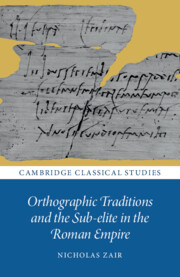The diphthong /ɔu/ became /oː/ and then /uː/ by the third century BC (see pp. 39–40). On the use of <o> in place of <u> in poplicos > pūblicus and words derived from it, see Chapter 17. It is possible that iodicauerunt (Kropp 11.1.1/26) in a curse tablet from Carthage, in the second century AD, for iūdicāuē̆runt < *i̯oudik- is an old-fashioned spelling representing the mid-point of the change (at any rate, no other explanation springs to mind). Since we have long /uː/ in the first syllable, this spelling cannot be explained by confusion of /ɔː/ and /u/. At least in legal texts, derivatives of iūs were particularly favoured for this (Reference DecorteDecorte 2015: 160–2), although use of <o> for /uː/ rather than <ou> was never common, even in the archaic period.
Book contents
- Orthographic Traditions and the Sub-elite in the Roman Empire
- Cambridge Classical Studies
- Orthographic Traditions and the Sub-elite in the Roman Empire
- Copyright page
- Dedication
- Contents
- Figures
- Tables
- Foreword
- Note on the Text
- Abbreviations
- Chapter 1 Introduction
- Part I Old-fashioned Spellings
- Chapter 2
for /ae̯/ - Chapter 3
and for /iː/ - Chapter 4
for /u/ - Chapter 5
for /uː/ - Chapter 6 Alternation of and
- Chapter 7
for /we/ before a Coronal - Chapter 8
and for /wu/ and /uu/, and and for /kwu/ - Chapter 9 Double Letters to Write Long Vowels
- Chapter 10
for /g/ - Chapter 11
for /jj/ - Chapter 12
before /a(ː)/ and before /u(ː)/
- Chapter 13
for /k/ before Back Vowels - Chapter 14
for /ks/ - Chapter 15 Geminates and Singletons
- Chapter 16 spepondi
- Chapter 17 popl- and pupl- for publ-
- Part II Apices and i-longa
- Appendix
and in Catullus - Bibliography
- Index
Chapter 5 - <o> for /uː/
from Part I - Old-fashioned Spellings
Published online by Cambridge University Press: 25 May 2023
- Orthographic Traditions and the Sub-elite in the Roman Empire
- Cambridge Classical Studies
- Orthographic Traditions and the Sub-elite in the Roman Empire
- Copyright page
- Dedication
- Contents
- Figures
- Tables
- Foreword
- Note on the Text
- Abbreviations
- Chapter 1 Introduction
- Part I Old-fashioned Spellings
- Chapter 2 for /ae̯/
- Chapter 3 and for /iː/
- Chapter 4 for /u/
- Chapter 5 for /uː/
- Chapter 6 Alternation of and
- Chapter 7 for /we/ before a Coronal
- Chapter 8 and for /wu/ and /uu/, and and for /kwu/
- Chapter 9 Double Letters to Write Long Vowels
- Chapter 10 for /g/
- Chapter 11 for /jj/
- Chapter 12 before /a(ː)/ and before /u(ː)/
- Chapter 13 for /k/ before Back Vowels
- Chapter 14 for /ks/
- Chapter 15 Geminates and Singletons
- Chapter 16 spepondi
- Chapter 17 popl- and pupl- for publ-
- Part II Apices and i-longa
- Appendix and in Catullus
- Bibliography
- Index
Summary
The diphthong /ɔu/ became /oː/ and then /uː/ by the third century BC (see p. 000). On the use of <o> in place of in poplicos > pūblicus and words derived from it, see p. 000. It is possible that iodicauerunt (Kropp 11.1.1/26) in a curse tablet from Carthage, in the second century AD, for iūdicāuē̆runt < *i̯oudik- is an old-fashioned spelling representing the mid-point of the change (at any rate, no other explanation springs to mind). Since we have long /uː/ in the first syllable, this spelling cannot be explained by confusion of /ɔː/ and /u/. At least in legal texts, derivatives of iūs were particularly favoured for this (Decorte 2015: 160–2), although use of <o> for /uː/ rather than <ou> was never common, even in the archaic period.
- Type
- Chapter
- Information
- Publisher: Cambridge University PressPrint publication year: 2023
- Creative Commons
- This content is Open Access and distributed under the terms of the Creative Commons Attribution licence CC-BY-NC-ND 4.0 https://creativecommons.org/cclicenses/

